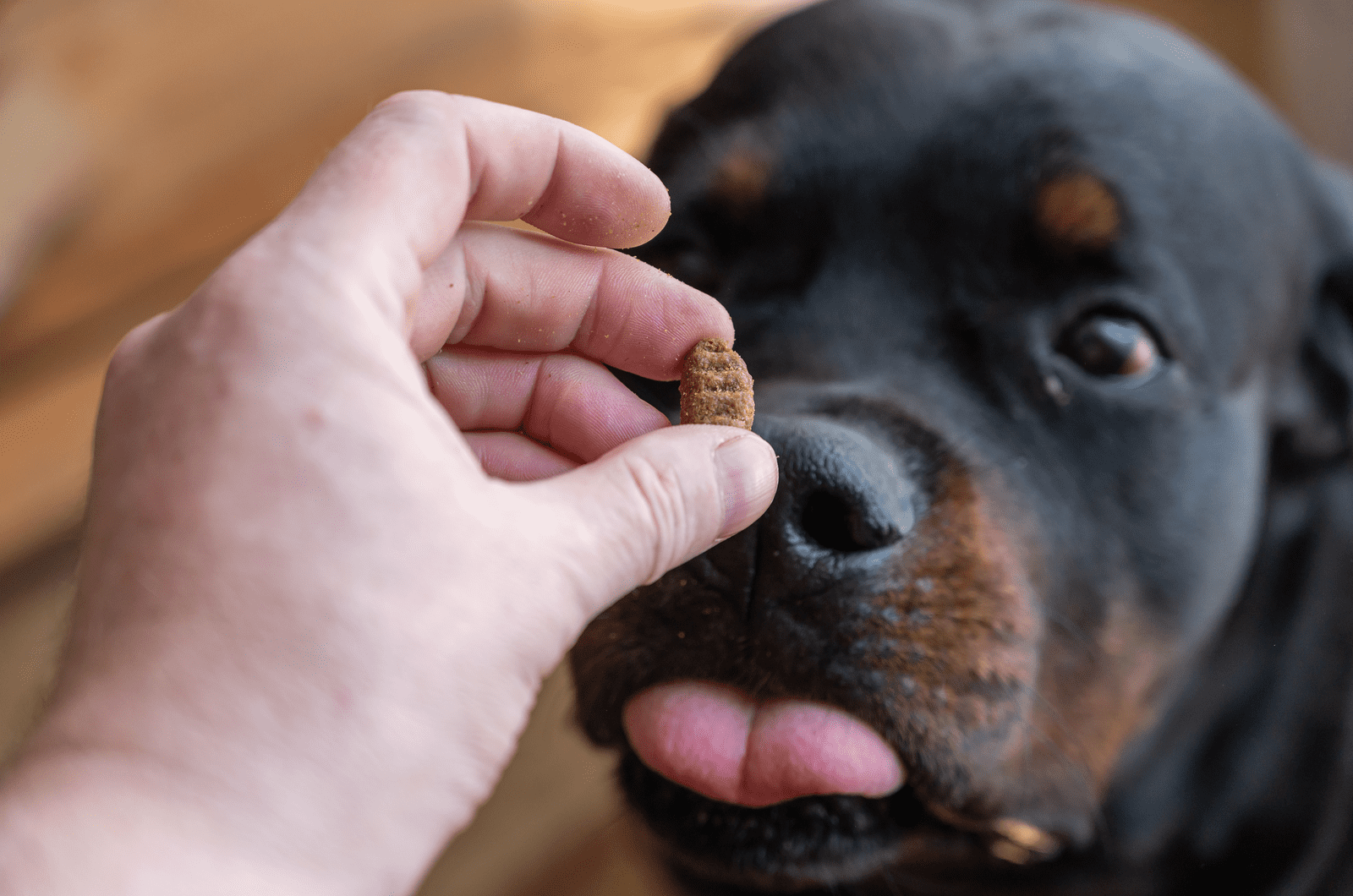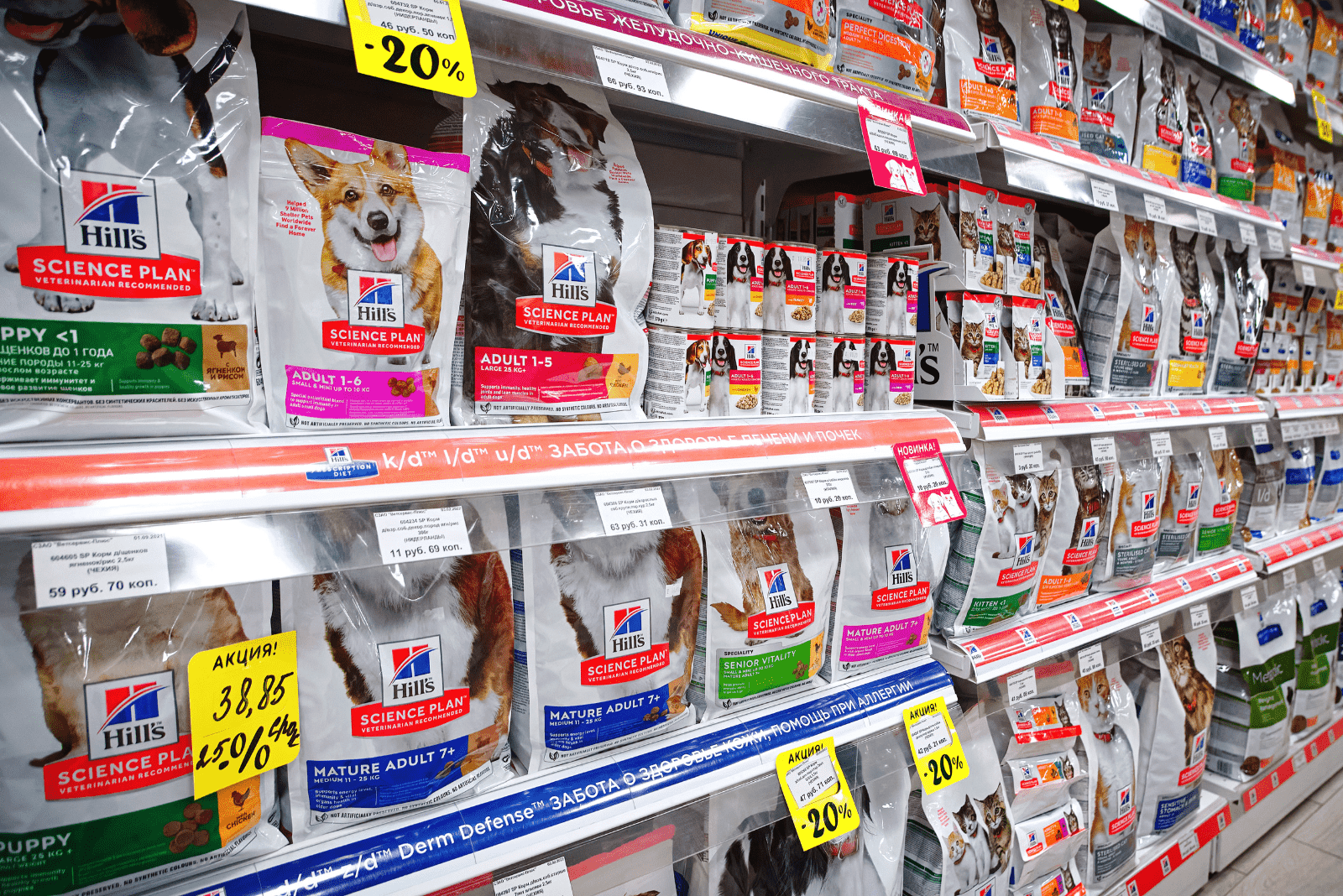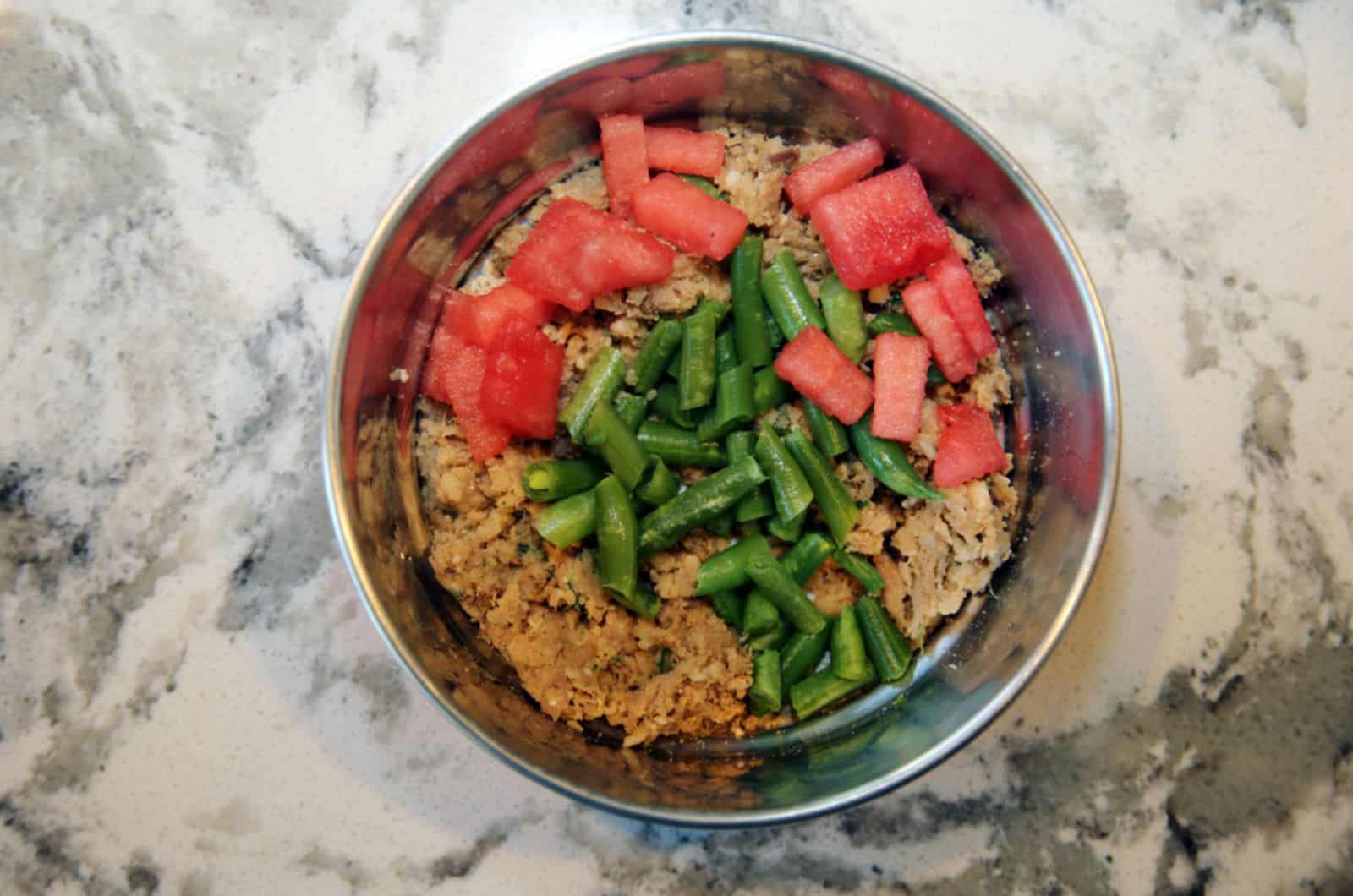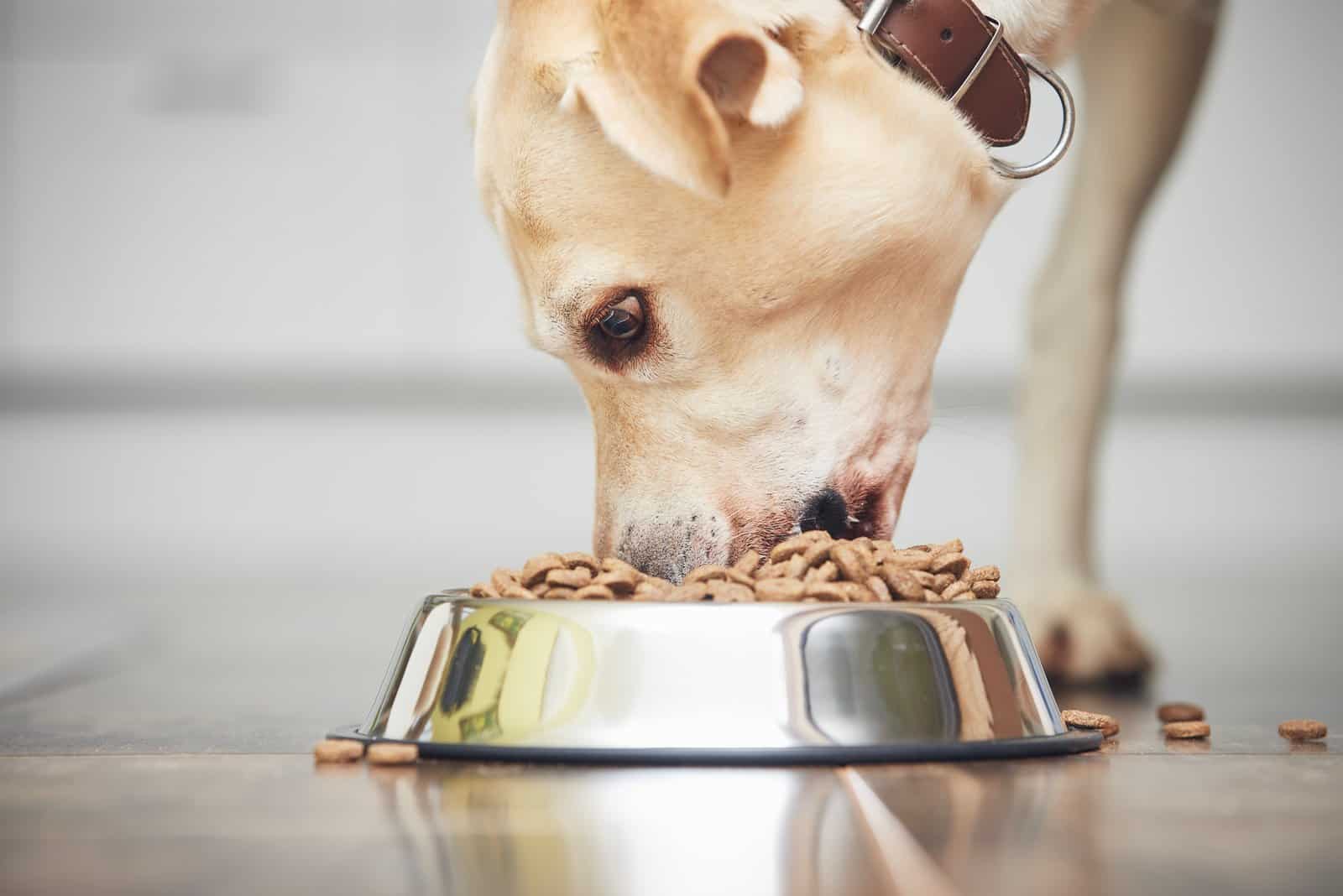Edamame beans are a healthy addition to a human diet, but what about our furry friends?
Can they enjoy the health benefits, or are there hazards to be aware of?
After all, many human foods are harmful to pooches, so dog owners need to be careful about what they feed their pets.
We’re taking a deep dive into the world of these super-healthy green beans to discover whether they’re safe for our fur babies.
Can Dogs Eat Edamame?
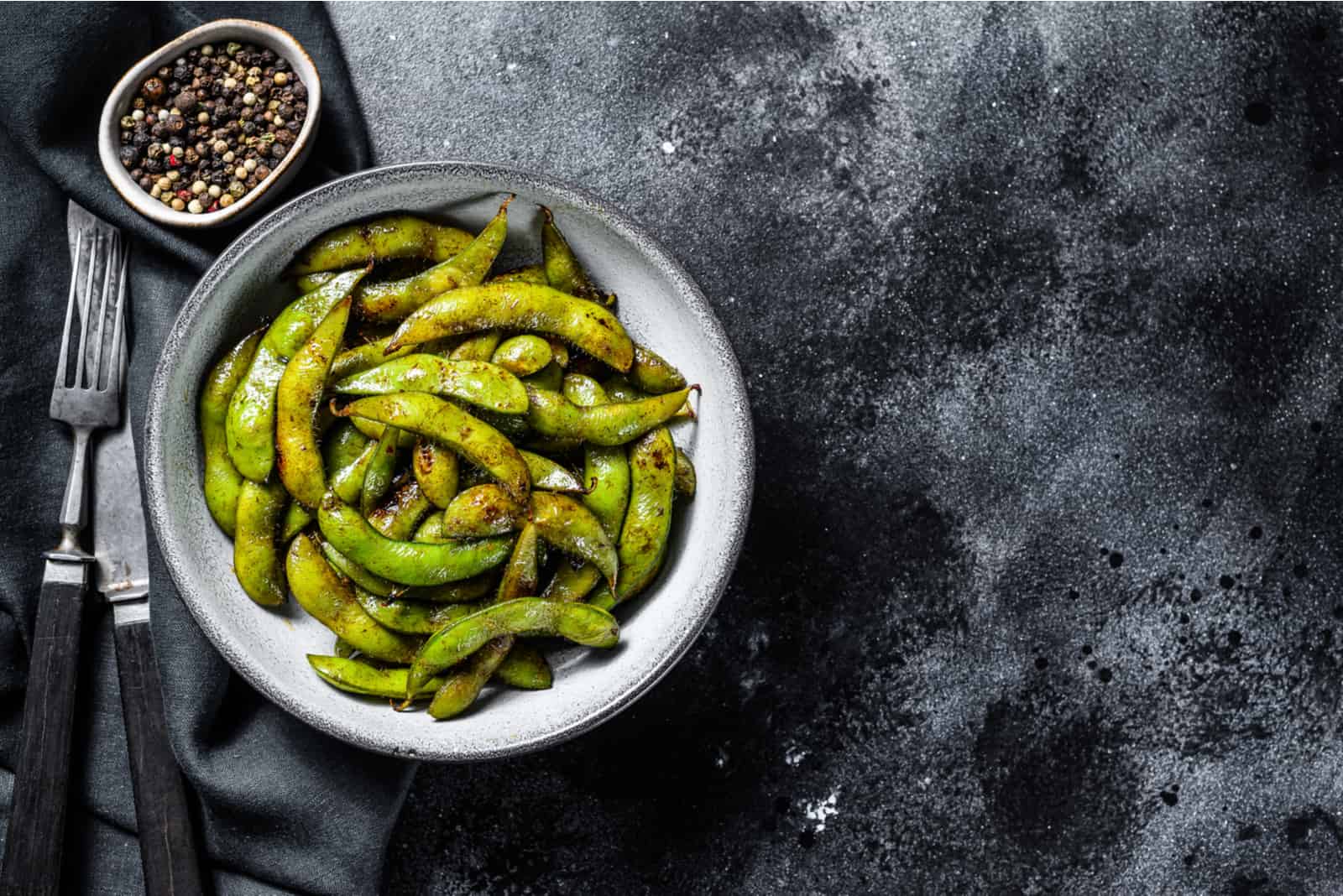
There’s good news and bad news here.
The good news is that edamame beans don’t contain any substance that’s toxic to dogs.
The bad news is that they are actually immature soybeans, and soy is a widespread allergen to dogs.
If you are considering feeding your dog edamame, only offer a tiny amount so you can watch for any adverse effects.
Typical symptoms of food allergies include:
• Upset stomach (vomiting and diarrhea)
• Excessive scratching
• Obsessive licking
• Hair loss
• Bacterial ear infection
• Skin infections
• Inflamed eyelid (blepharitis)
• Seborrheic dermatitis (scaly, itchy skin)
Can dogs eat edamame? As long as they’re not allergic to soy!
We also need to look at how the beans are prepared, as this makes a difference in whether your dog can eat them or not.
Can Dogs Have Edamame Raw?

The general consensus is that raw edamame beans are safe for dogs. However, you should always cook them first before eating them yourself, as they are considered toxic for humans until they are cooked.
However, it seems that dogs can safely eat them raw, cooked, or even frozen!
The key here is to only give your pooch a few at a time to crunch on.
In fact, whether cooked or not, it’s best to keep the quantity small as edamame has a high fiber content. Too much of this in your dog’s diet can lead to gas, constipation, diarrhea, and bloating.
What’s The Best Way To Cook Edamame For Dogs?
In Japan, these beans are traditionally boiled in salt water (a 4% solution), and no extra salt is added. Alternatively, the beans are boiled or steamed, then dipped in salt or drizzled with soy sauce. You can even have roasted or baked edamame!
However, none of these options are a good choice for dogs, primarily because of what’s added to them.
Us humans love savory umami flavors, so we smother our food in seasonings. The trouble is that dogs can’t handle too much salt.
Our canine buddies are prone to sodium ion (salt) poisoning and can become seriously dehydrated. When this happens, their bodies draw fluids from elsewhere, starting with the brain and muscles, leading to depression, confusion, tremors, vomiting, diarrhea, and unconsciousness (coma).
Because of this, plain edamame beans are best, either steamed, boiled, or baked (without oil).
Finally, always use fresh beans rather than processed ones, as these also contain salt and other additives.
Dogs Don’t Crave Flavor!
While dogs have a fantastic sense of smell, they only have around 1,700 taste buds, and in comparison, we have about 9,000.
This means that dogs aren’t as bothered about flavor as we are. So, when preparing food or treats for your pooch, don’t be too concerned about serving it up without seasoning.
Most dog owners will have witnessed the speed at which dog treats disappear, surely too quickly for their furry friend to have tasted it!
That doesn’t mean that they don’t taste at all, but they don’t have the same flavor experience as we do.
What Are The Benefits of Edame For Dogs?
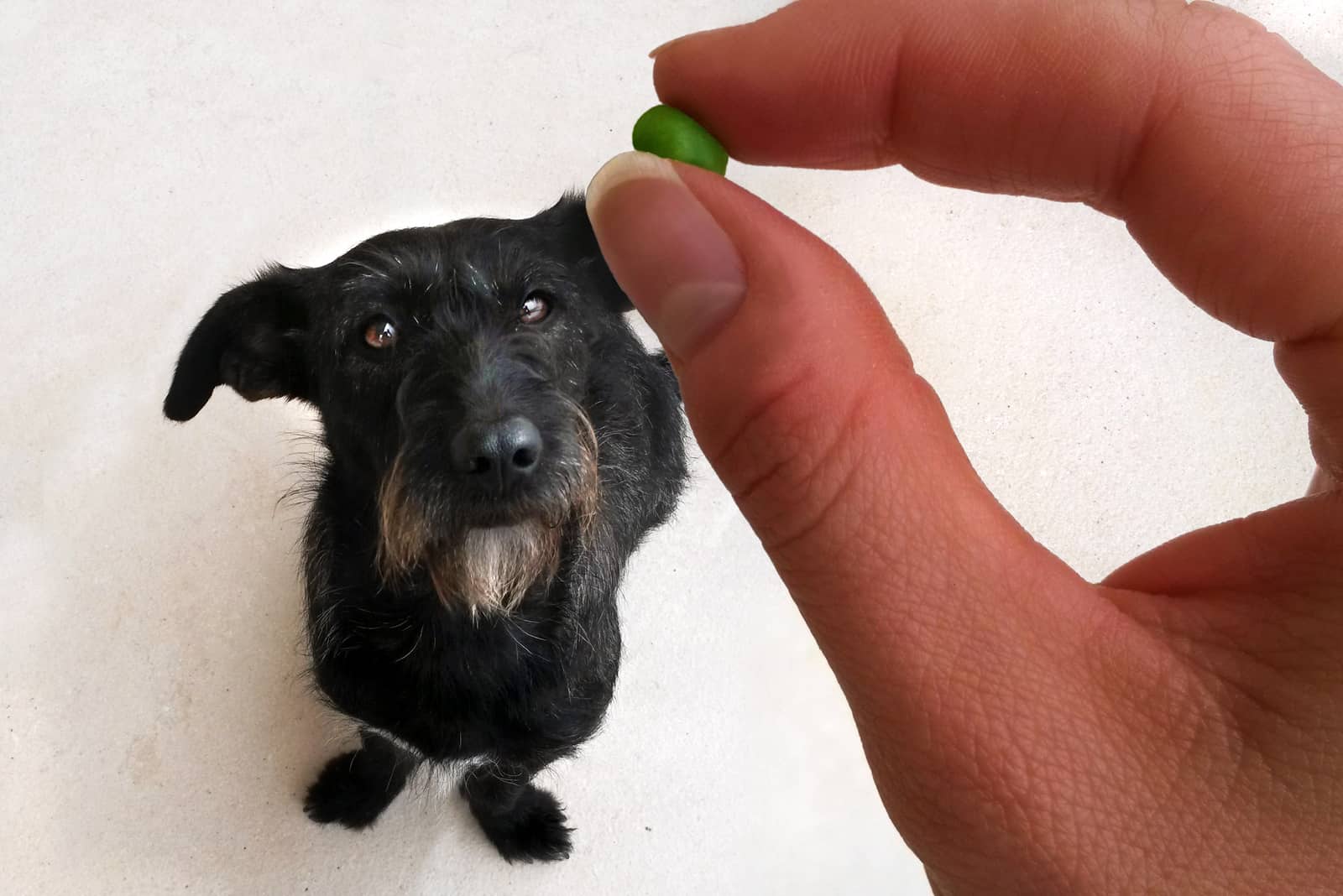
Yes, the health benefits of edamame are clear, and they are suitable for dogs if you follow a few basic rules!
Edamame (immature soybean) has long been a staple food in Asian cuisine but has recently grown in popularity across the western world because it is so healthy.
Exactly how good are they for your health?
Let’s take a look:
• Vitamin C
• Calcium
• Dietary fiber
• Iron
• Folate
• Vitamin K1
• Vitamin A
• Vitamin E
• Potassium
• Phosphorous
• Copper
• Omega-3 fatty acids
• Riboflavin
• Magnesium
• Protein
As veggies go, this is a pretty good list!
In fact, these beans are so good for you that they are believed to lower cholesterol and regulate blood sugar levels. This means they can significantly reduce the risk of obesity, heart disease, and type 2 diabetes.
These beans also contain potent antioxidants that fight the aging process, keep the immune system healthy, and fight cancer-causing particles.
Edamame beans are a good source of healthy carbohydrates, too, so they can be used in place of processed foods high in unhealthy carbs.
Can dogs eat edamame? Yes, because they are healthy!
Are There Any Hazards To Edamame?
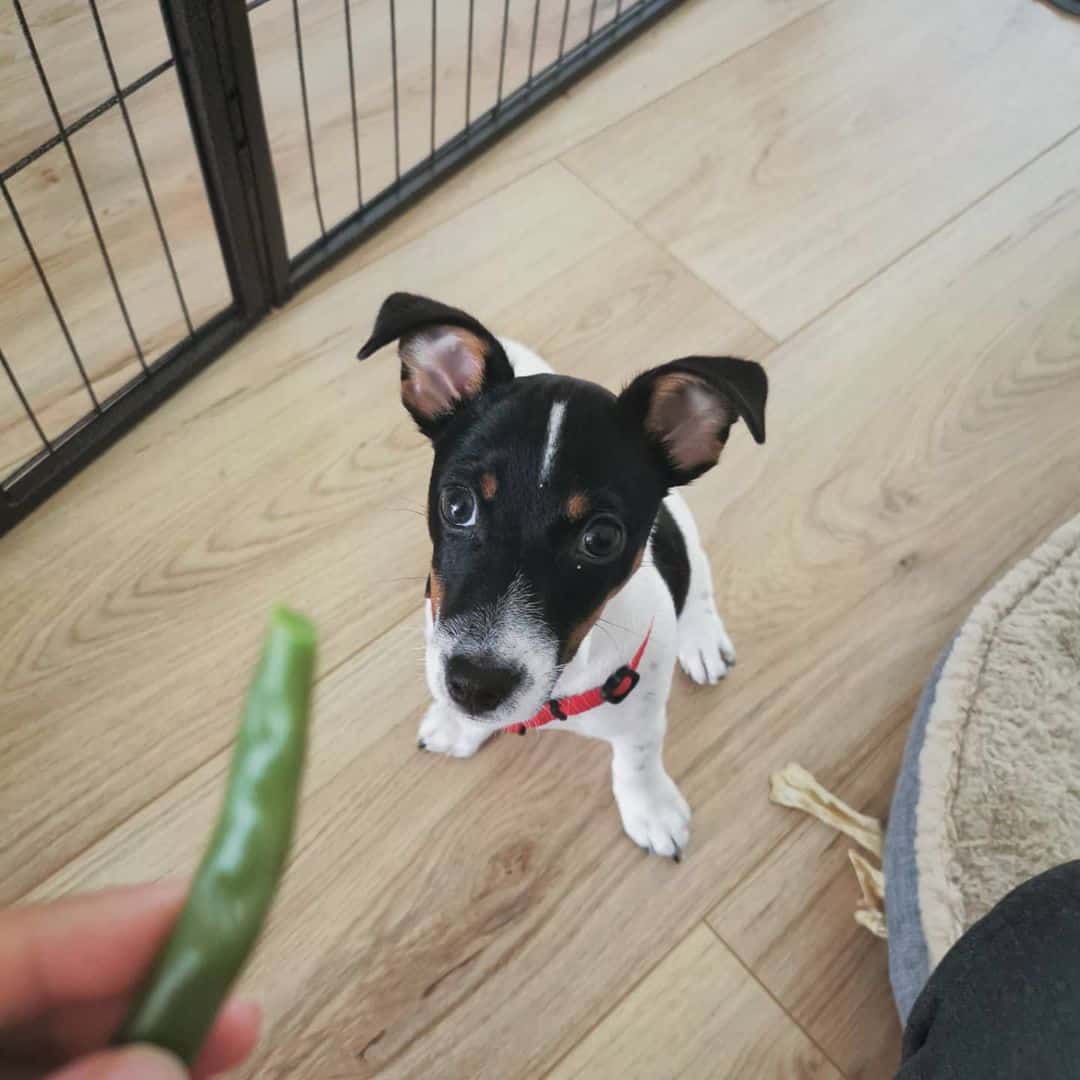
Photo from: @hello_im.milo
The main health risk lies in the edamame pods, which can present a choking hazard, especially for smaller dogs.
Also, even if the dog manages to eat them safely, the edamame shells are tough and fibrous and may block the digestive system.
On the whole, it’s definitely worth taking time to remove the beans from the pods before feeding them to your dog.
One other risk has already been mentioned, and that’s to limit the number of edamame beans you feed your dog because of the potentially unpleasant side effects.
Finally, we should mention that some studies suggest that regular consumption of soy can cause health issues, such as damage to the kidney and thyroid gland. Soy has also been tentatively linked to hormone disruption and the early onset of puberty.
However, very few of these reports present any convincing or compelling evidence, and most appear to be in retaliation to the exponential rise in popularity of vegetarian and vegan diets. It’s an established fact that the dairy industry (especially in the US) is in decline.
On balance, it is entirely safe to eat soy or feed it to your dog in small amounts as part of a balanced, healthy diet.
My Dog Ate Edmame Shells!

So, your dog wolfed down a bunch of edamame beans, shells and all. It’s only natural to be concerned because you care about that fur-ball.
The first thing to do is be thankful that the shells made it safely down your dog’s throat without choking them. Okay, so it might not be much comfort right now, but it’s not easy to deal with a choking dog. More than 200,000 choking incidents are reported each year in the US, and thousands more are not reported.
In many cases, it’s too late to save the dog by the time the owner gets them to the vet’s office. And few dog owners know how to perform the Heimlich maneuver on their dogs successfully!
Your furry pal is safe – for now. Keep a close eye on them for the next few hours as they start to digest the beans. Those shells (or pods) are pretty tough and may not break down in your dog’s stomach.
Your pooch may have diarrhea or start vomiting. They may strain but not be able to poop. They might become weak and lose their appetite. Yes, it’s a little unhelpful, as these are symptoms of many other health conditions! If you’re worried, speak to your vet for advice.
It may be as well to advise your vet of the situation anyway; at least they’ll be prepared for any emergency later.
The most likely outcome from eating these pods will be an upset stomach. However, if your dog shows any signs of real discomfort, speak to your vet without delay.
Can My Dog Eat Edamame Snacks?

No, this is not the best idea. Your typical edamame snack from the grocery store is highly processed and stuffed with salt, sugar, and flavorings.
None of these additives are good for your dog’s health and could make them sick. In fact, no type of spicy foods is safe for dogs.
Ideally, you should always avoid feeding your pooch processed foods designed for humans. Fried and fatty foods are particularly bad as they contribute to pancreatitis. The damage from pancreatitis builds over time, causing the pancreas to produce harmful toxins that attack and destroy the dog’s bowel.
Also, as mentioned above, too much salt is not ideal for your furry friend. Dogs need salt for their bodies to function properly, but there’s a fine line between enough and too much!
Can dogs eat edamame? Yes, but avoid processed snacks as these are not suitable for your pooch. Only use fresh beans and serve them plain.
Is Edamame Safe For Dogs?

We’re sort of asking the same question differently to get the message across: Yes, edamame is safe for dogs to eat, as long as you take the necessary precautions!
Dogs that are intolerant or allergic to soy products should avoid edamame entirely as it will give them digestive issues and various other nasty symptoms.
If your dog is okay with soy, only give them small amounts as an occasional treat, never as the central part of their diet.
Don’t serve the beans in their pods as your dog may choke on them, get an upset stomach, or experience an intestinal blockage.
Read Next: Are Green Beans Good For Dogs? Is This Veggie Approved For Dogs?
Although you’ll find experts who warn against feeding dogs any type of soy product, most of the evidence proves that edamame is safe and provides many health benefits.
Can Puppies Have Edamame?

Generally speaking, yes. However, you need to take extra care with puppies to avoid making them sick. Also, it’s essential to keep those pods out of their reach as they are very likely to choke.
Puppies need good quality food to build up their little bodies ready for adulthood. Without adequate nutrition, they won’t reach their full potential.
Puppyhood is a time for building the foundations of their health, and they need to develop a robust musculoskeletal system and healthy internal organs. Any junk food (salty, sugary snacks, or fried, processed foods, or even bagels) at this stage could disrupt this and cause a lot of damage.
Healthy treats are a sensible option, and a tablespoon of edamame beans once a week or so won’t do any harm. Any more than this may upset their delicate little tummies!
Conclusion: Can Dogs Eat Edamame?

Dogs can eat edamame beans as long as they are served plain and without seasoning.
The most crucial factor is to check that your dog isn’t allergic or intolerant to soy products.
You can serve them raw, baked, steamed, boiled, or roasted but avoid using oil.
Servings should be small and given only as an occasional healthy treat, never as a main component of your dog’s diet. Ideally, your furry companion should get all the nutrition it needs from its regular dog food.
It’s okay to use a few edamame beans instead of your pet’s usual dog treats, but too many of these beans may upset their digestive system.
Avoid giving them the pods (or shells) as these present a choking hazard and may cause an intestinal blockage.
Otherwise, you’re good to go!
A small handful of edamame beans once in a while will contribute to their overall health.
Read Next: 8 Best Home Remedies For A Sick Dog Not Eating







